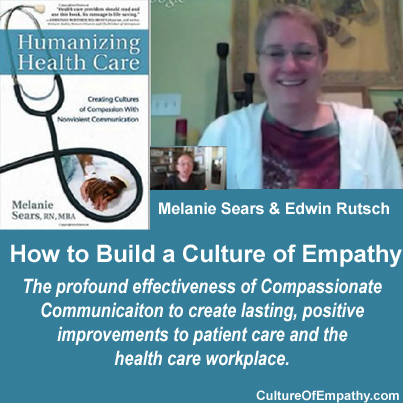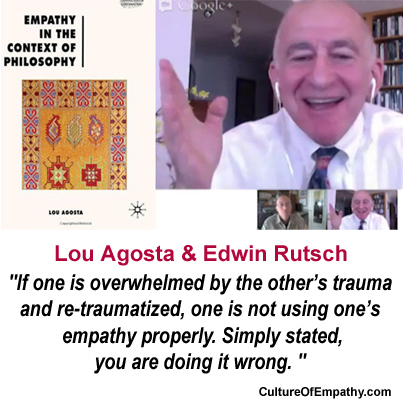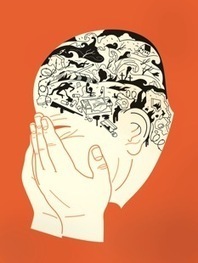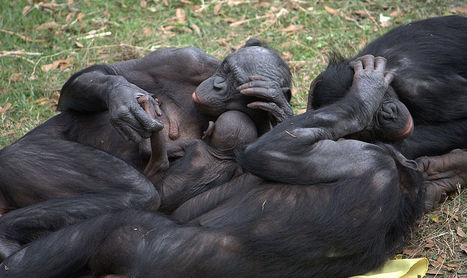 Your new post is loading...
 Your new post is loading...

|
Scooped by
Edwin Rutsch
May 19, 2013 1:45 PM
|
Melanie Sears has been a trainer for the Center of Nonviolent Communications since 1991. She works with businesses, hospitals, nursing homes, hospices, individuals, couples and parents in transforming their usual way of operations, interpersonal interactions and dealing with conflict to one which is more compassionate, conscious and effective. Melanie presents Nonviolent Communication at conventions, at universities, and at churches. She has been interviewed on the radio and on TV and is the author of several books including: Humanizing Health Care with Nonviolent Communication.

|
Scooped by
Edwin Rutsch
May 19, 2013 1:42 PM
|
Lou Agosta is on the faculty of the Illinois School of Professional Psychology. He practices psychotherapy in the Chicago. His area of concentration includes the dynamic containing and transforming of domestic violence and intimate partner abuse. Lou is author of Empathy in the Context of Philosophy which is an exploration of the deep structure of empathy as a fundamentally human capability for creating possibilities of community and human relations. He also writes extensively about the nature of empathy on his websiteListeningWithEmpathy.com.

|
Scooped by
Edwin Rutsch
May 18, 2013 4:16 PM
|
When I first heard that autistic people didn't have empathy, I assumed my son Mickey must be an exception. He was not yet 2 when the developmental specialist told us all the things our child would never do. Pretend play. Eye contact. Empathy. I remember sitting on the floor of his bedroom days later, hugging my knees to my chest and watching Mickey build block towers, thinking, who was this child? Had he suddenly become a stranger?.. So why does this myth that autistic people lack empathy persist? The reasons are complicated -- a convergence of media, popular culture, and ignorance. Liane Kupferberg Carter

|
Scooped by
Edwin Rutsch
May 18, 2013 4:07 PM
|
Women’s rights advocate Lisa Shannon called on graduates of the College to exercise empathy as a means of empowerment at commencement Saturday. “I’d like to talk about power. It’s a tricky thing because it so often lurks in the moments that we least expect to find it,” Shannon said. “The empathy switch, flip it on, keep it on, it will fuel you over the threshold of doubt, of fear, of discomfort to find power.”
Shannon discussed her efforts to lobby Congress to pass a bill to combat the use of conflict minerals in 2010. She said empathy helped her protest and confront people opposed to the bill.
“Some people talk about compassion fatigue as though empathy wears you down. I’ve actually found the opposite to be true,” she said. “I found empathy to operate more like a muscle, the more you exercise it, the more power it gives, the more reflexive it becomes. It’s not that stepping up become more comfortable. It’s just that comfort becomes less relevant in the face of this sort of empathy override.” By Eitan Sayag

|
Scooped by
Edwin Rutsch
May 17, 2013 1:11 PM
|
Jan Birchfield, Ph.D. writes about the basis of a shared ethic in leadership—happiness—and why we should look inward before trying to solve the world’s problems.
Social entrepreneurship has given me, and many others, a great deal of hope. With the overwhelming number of social ills in virtually every sector of our society, it is heartening to see the growth of a movement that combines the discipline, rigor, flexibility, and innovation of the entrepreneurial business sector with the core mission of delivering social value above all else, including wealth creation. The movement, in part, challenges innovators to ask, how can we better meet the enormous challenges of the world around us, or, how can we better serve?

|
Scooped by
Edwin Rutsch
May 16, 2013 8:02 PM
|
Sensitive men are incredibly attractive. They are path-forgers in the new paradigm of the evolved man. Strong and sensitive. Intuitive and powerful. They're able to give and receive love without ambivalence, being "unavailable," or commitment phobia. In my book Emotional Freedom, I write extensively about the power of empaths and describe strategies for how empaths can stay centered and strong in an overwhelming world. Since I'm an empath and worship sensitivity, I want to help empathic men (and women) cultivate this asset and be more comfortable with it. Empathic men often have a harder time than women because in Western culture sensitivity may be seen as a weakness or too "feminine." This is a huge misconception. The new evolved man is skillful in balancing both the masculine and feminine in himself, embodying his full power. Judith Orloff MD

|
Scooped by
Edwin Rutsch
May 16, 2013 5:44 PM
|
In the May 20, 2013, issue of The New Yorker, Yale psychologist Paul Bloom agreed with my point. In reviewing a spate of recent books advocating the importance of empathy, Bloom concludes that empathy can only get us so far. He points out that empathy works to move us out of ourselves, but its range is quite limited. We can often feel empathy for specific individuals who have suffered terribly – such as James “Bim” Costello whose picture showing him staggering from the Boston Marathon bomb site was plastered in newspapers and the web.
But it’s a lot harder to feel empathy for nameless victims who are only reported in the news media as statistics. This is why Bloom rejects empathy as an adequate grounds for morality.

|
Scooped by
Edwin Rutsch
May 16, 2013 5:40 PM
|
(Reuters) - For biologist Frans de Waal, a peaceful species of great ape in Africa is a mirror of humanity and a living argument that empathy and cooperation are far from unique to mankind. "The Bonobo and the Atheist: In Search of Humanism among the Primates", argues that both traits may be evolved behaviours based on his studies of the bonobo, which is found only in the jungles of the Democratic Republic of Congo, and other primates.

|
Scooped by
Edwin Rutsch
May 16, 2013 5:28 PM
|
In my article in the magazine this week, I made the case against empathy. Our capacity to put ourselves in the shoes of others—to feel their pain, to make their goals our own—might well be essential for intimate relationships. Nobody would deny that parents should feel empathy toward their children, or that romantic love requires the bond that empathy provides. But when we use empathy as a guide to policy, it often takes us in irrational and cruel directions.
BY PAUL BLOOM

|
Scooped by
Edwin Rutsch
May 15, 2013 3:53 PM
|
When someone is in physical pain, it is common for others to respond to that pain, both physically and emotionally. They may act in ways that will help alleviate the physical pain, and they may actually feel emotional symptoms of the other person’s pain. Likewise, when emotional pain is witnessed, such asgrieving, witnesses may also feel a sense of sadness or loss. These two different kinds of pain and how they are processed were the focus of a recent study led by Emile Bruneau of the Department of Brain and Cognitive Sciences at the Massachusetts Institute of Technology. Bruneau wanted to see what regions of the brain were involved in processing empathetic responses to others’ physical and emotional pain, and whether these processes were distinct or shared.

|
Scooped by
Edwin Rutsch
May 15, 2013 2:22 PM
|
In a world where we tend to think of business in terms of the bottom line and financial metrics, a discussion on the role of empathy can seem at best a soft-issue, and at worst, downright absurd. Instead, the importance of plugging into and reflecting consumer sentiment, and the value of bringing levels of emotional intelligence and empathy into the business world is something that is bringing far greater worth. Empathy is essential to providing better customer experiences. If you understand your customers, you'll be well equipped to give them exactly what they need. Indeed, there is growing evidence that organisations that have happy employees, strong organisational health, empathetic leaders, and a social mission, outperform their peers. The notion of 'empathy as a social currency' is something which is gaining increasing prominence in the business world. In the book Humanize, Grant & Notter make the point that empathy is a currency that should be deployed in order to serve internal and external customers. by Rose Schreiber - Consultant and professional generalist

|
Scooped by
Edwin Rutsch
May 14, 2013 2:21 PM
|
This week's conversation is with Vineet Singal, Stanford Class of 2012. Singal was selected as 30 under 30 by Forbes Magazine. He is the Co-Founder and CEO of Anjna. Anjna is a nonprofit health technology company that focuses on utilizing mobile technology to improve health outcomes and reduce healthcare costs in low-income health settings. It has been profiled in the New York Times, Forbes, the Huffington Post, and conferences like TEDxTampaBay and Medicine 2.0.

|
Scooped by
Edwin Rutsch
May 13, 2013 7:08 PM
|
This month, as the city prepares to welcome the Dalai Lama, several special events will be held to celebrate Louisville's status as a "Compassionate City" and Mayor Greg Fischer's mission to make the city a friendlier, more caring place to live and visit. The Kentucky Center will be participating in, hosting, and supporting many of these events. The Compassionate Resolution The Kentucky Center has drafted and approved a resolution to uphold the Charter for Compassion, signifying our commitment to being a compassionate organization via such elements as empowerment, transparency, hospitality and abundance. To ensure this resolution has tangible outcomes at The Center, a staff committee has been formed (named "Centered on Compassion") to identify the compassionate work The Center has already been doing, to monitor the progress of our "compassionate" identity, and brainstorm/execute additional ways in which we can embrace the principles of this resolution.
|

|
Scooped by
Edwin Rutsch
May 19, 2013 1:43 PM
|
Marco Iacoboni, Lidewij Niezink and Edwin Rutsch discuss Definitions, Measurements & Metrics of Empathy.
Marco Iacoboni is Professor of Psychiatry and Biobehavioral Sciences and Director of the Marco Iacoboni Lab, UCLA Brain Mapping Center at the University of California, Los Angeles.
He is author of, Mirroring People: The New Science of Empathy and How We Connect with Others. Marco says, "I think what's interesting to me most is to define metrics of empathy. How can I measure this thing? Why it matters? If we want to design interventions to improve empathy we need to agree upon ways of quantifying it. People do get bogged down in debates on definitions and don't even get to the point of trying to discuss metrics of empathic behavior. This slows down progress, I think" Sub Conference: Science

|
Scooped by
Edwin Rutsch
May 18, 2013 6:21 PM
|
Compassion is a response to suffering—our own, and to the pain of others. The word comes from the Latin meaning to co-suffer. Compassion is noticing pain, feeling it with another person, and then responding to it n some way. What an exciting-mind-blowing week I’ve had! I have “Skyped” with people from all over the world, participated in Google Hangouts, recommended materials for a peace education project in Indonesia, introduced a few European schools to Canadian child advocate Mary Gordon’s Roots of Empathy, tuned in teachers to the work of Sugata Mitra, the 2013 TED award winner, and his experiment, “Hole in the Wall”, and started work with a number of schools who would like to create an action plan to become compassionate schools.

|
Scooped by
Edwin Rutsch
May 18, 2013 4:12 PM
|
Most of us would agree that one strong example of a "not-good" person is the psychopath. Psychopathy is "a psychological condition in which the individual shows a profound lack of empathy for the feelings of others, a willingness to engage in immoral and antisocial behavior for short-term gains, and extreme egocentricity." [1] This "profound lack of empathy" means he only cares about what he wants and feels no guilt about manipulating or using aggression to get it. These folks scare us. And they teach us something important about the path to goodness: it must include empathy.
Cindy Wigglesworth

|
Scooped by
Edwin Rutsch
May 17, 2013 5:35 PM
|
So I would plead with researchers to take great care when labeling the conclusions of this kind of research. Because if the researchers don't keep in mind that people with autism may not understand the Sally-Anne story, or that autistic children may have different ways of expressing their empathy, it's the researchers who truly lack empathy -- and compassion

|
Scooped by
Edwin Rutsch
May 16, 2013 8:14 PM
|
In our efforts to solve difficult social problems in particular, we rely too heavily on reason and numbers and econometrics, and not often enough on empathy. Empathy," writes Paul Bloom in The New Yorker this week, "is parochial, narrow-minded, and innumerate. We're often at our best when we're smart enough not to rely on it." We'd be better off were we to supplant our flawed empathetic sensibilities with reason (that most flawless of human capacities). His central argument is a utilitarian one: empathy is an often irrational emotional response that plays favorites, he says. It is thus a poor mechanism for solving real problems and making tough choices -- whether distributing international aid or making sacrifices today so that we don't warm our planet to oblivion tomorrow.... But to truly empathize is not easy. In this sense Bloom is right: we're more likely to do so with those who look and think like we do. So rather than dismiss empathy, why not commit ourselves to practicing it more deliberately and more often, and expanding our spheres of empathy to those who are not just different but who challenge some of our very own moral foundations? by Michael Zakaras

|
Scooped by
Edwin Rutsch
May 16, 2013 6:43 PM
|
For the fifth consecutive year, Sapienza University of Rome will host artists, performers, filmmakers, scholars and neuroscientists from different research centers in Europe and the United States on the occasion of the International Conference Dialogues between theater and neuroscience . neuroestetica the theatrical anthropology, from studies on empathy to research on intersubjectivity, moving from studies of motor cognition, memory, emotions, on mirror neurons and alternative therapies.

|
Scooped by
Edwin Rutsch
May 16, 2013 5:42 PM
|
There's an interesting discussion of empathy in a column by Paul Bloom at The New Yorker. Bloom begins by summarizing the generally good press that empathy gets these days, because it is seen as humanizing our responses to the sufferings... I think Bloom's point must be taken. But what, really, is this point? That empathy isn't self-sufficient? It certainly isn't. To operate effectively it needs the assistance of reason and the weighing of empirical evidence. I agree with him too - as I've argued on my own account in a recent paper - that 'it is impossible to empathize with seven billion strangers'. At the same time, how damning is it of empathy to point out that it is not all we require? Reason is also not all we require, but it is no less precious for all that. Empathy, in conjunction with other human faculties, is an invaluable way towards solidarity with others and humane action.

|
Scooped by
Edwin Rutsch
May 13, 2013 11:10 PM
|
Empathy research is thriving these days. Several new books enthusiastically champion an increase in empathy as a cure for humanity’s ills. This enthusiasm may be misplaced, however. In 2008, Karina Encarnacion, an eight year-old girl from Missouri, wrote to President-elect Barack Obama with some advice about what kind of dog he should get for his daughters. She also suggested that he enforce recycling and ban unnecessary wars. Obama wrote to thank her, and offered some advice of his own: “If you don’t already know what it means, I want you to look up the word ‘empathy’ in the dictionary. I believe we don’t have enough empathy in our world today, and it is up to your generation to change that. This wasn’t the first time Obama had spoken up for empathy.

|
Scooped by
Edwin Rutsch
May 16, 2013 5:26 PM
|
For biologist Frans de Waal, a peaceful species of great ape in Africa is a mirror of humanity and a living argument that empathy and cooperation are far from unique to mankind.
"The Bonobo and the Atheist: In Search of Humanism among the Primates", argues that both traits may be evolved behaviors based on his studies of the bonobo, which is found only in the jungles of the Democratic Republic of Congo, and other primates...
He spoke with Reuters by telephone from his home about his book and take on religion, evolution and monkey business.
by Ed Stoddard
img http://en.wikipedia.org/wiki/Bonobo ;
Culture of Empathy Builder Page: Frans de Waal
http://j.mp/YhPg01 ;

|
Scooped by
Edwin Rutsch
May 15, 2013 3:50 PM
|
Jessica Williams aids a conservative politician suffering from acute compassion. A former Utah state legislator questions his own conservative beliefs, so Jessica Williams steps in and helps him return to his dogmatic roots.

|
Scooped by
Edwin Rutsch
May 14, 2013 6:10 PM
|
Sociopathy affects an estimated 1-4% of the population, but not all sociopaths are cold-blooded murderers. They're best described as people without a conscience, who prey on those with high levels of empathy, but themselves lack any concern for others' feelings and show no remorse for their actions. Drawing on real life cases, The Empathy Trap explores this taboo subject and looks at how people can protect themselves against these arch-manipulators.
Topics include: Defining sociopathy, and related conditions such as psychopathy, narcissism, and personality disorder; how sociopaths operate and why they're often difficult to spot; identifying sociopathic behaviour; the sociopath's relations with other people and why they often go unpunished; coping with the aftermath of a destructive relationship; re-establishing boundaries and control of your life; practical advice for keeping sociopaths at bay; resources and further help.

|
Scooped by
Edwin Rutsch
May 14, 2013 2:07 PM
|
Audio: Mary Gordon discusses her program "Roots of Empathy," which sees school-age children interacting with a mother and child. She says this helps them develop a better sense of empathy, which leads to reduced aggression in the classroom.
|
 Your new post is loading...
Your new post is loading...
 Your new post is loading...
Your new post is loading...




































